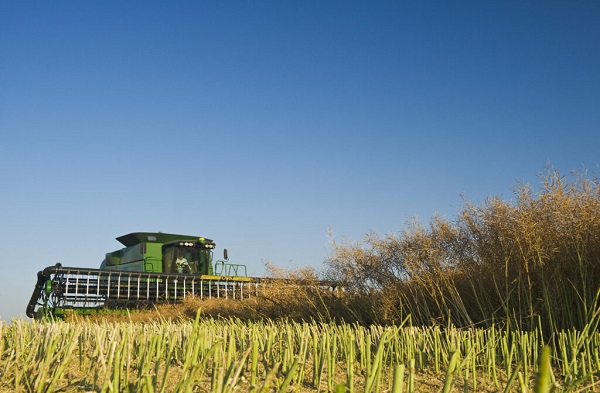Agriculture
2024 harvest wrap-up: Minister Sigurdson

As the 2024 growing season comes to a close, Minister of Agriculture and Irrigation RJ Sigurdson issued the following statement:
“While many Albertans were enjoying beautiful fall days with above-average temperatures, farmers were working around the clock to get crops off their fields before the weather turned. I commend their continued dedication to growing quality crops, putting food on tables across the province and around the world.
“Favourable weather conditions in August and early September allowed for a rapid start to harvest, leading to quick and efficient completion.
“The final yield estimates show that while the South, North West and Peace regions were slightly above average, the yields in the Central and North East regions were below average.
“Crop quality for oats and dry peas is currently exceeding the five-year average, with a higher rate of these crops grading in the top two grade categories. In contrast, spring wheat, durum, barley and canola are all grading in the top two grades at rates lower than the five-year average.
“Crop grading is a process that determines the quality of a grain crop based on visual inspection and instrument analysis. Factors like frost damage, colour, moisture content and sprouting all impact grade and affect how the grain will perform during processing or how the end product will turn out. Alberta generally produces high-quality crops.
“Farmers faced many challenges over the last few years and, for some areas of the province, 2024 was a difficult growing season. But Alberta producers are innovative and resilient. They work constantly to meet challenges head-on and drive sustainable growth in our agricultural sector.
“Alberta farmers help feed the world, and I’m proud of the reputation for safe, high-quality agricultural products that this industry has built for itself. Thank you to our producers, and congratulations on another successful harvest!”
Agriculture
Federal cabinet calls for Canadian bank used primarily by white farmers to be more diverse

From LifeSiteNews
A finance department review suggested women, youth, Indigenous, LGBTQ, Black and racialized entrepreneurs are underserved by Farm Credit Canada.
The Cabinet of Prime Minister Mark Carney said in a note that a Canadian Crown bank mostly used by farmers is too “white” and not diverse enough in its lending to “traditionally underrepresented groups” such as LGBT minorities.
Farm Credit Canada Regina, in Saskatchewan, is used by thousands of farmers, yet federal cabinet overseers claim its loan portfolio needs greater diversity.
The finance department note, which aims to make amendments to the Farm Credit Canada Act, claims that agriculture is “predominantly older white men.”
Proposed changes to the Act mean the government will mandate “regular legislative reviews to ensure alignment with the needs of the agriculture and agri-food sector.”
“Farm operators are predominantly older white men and farm families tend to have higher average incomes compared to all Canadians,” the note reads.
“Traditionally underrepresented groups such as women, youth, Indigenous, LGBTQ, and Black and racialized entrepreneurs may particularly benefit from regular legislative reviews to better enable Farm Credit Canada to align its activities with their specific needs.”
The text includes no legal amendment, and the finance department did not say why it was brought forward or who asked for the changes.
Canadian census data shows that there are only 590,710 farmers and their families, a number that keeps going down. The average farmer is a 55-year-old male and predominantly Christian, either Catholic or from the United Church.
Data shows that 6.9 percent of farmers are immigrants, with about 3.7 percent being “from racialized groups.”
National census data from 2021 indicates that about four percent of Canadians say they are LGBT; however, those who are farmers is not stated.
Historically, most farmers in Canada are multi-generational descendants of Christian/Catholic Europeans who came to Canada in the mid to late 1800s, mainly from the United Kingdom, Ireland, Ukraine, Russia, Italy, Poland, the Netherlands, Germany, and France.
Agriculture
Farmers Take The Hit While Biofuel Companies Cash In

From the Frontier Centre for Public Policy
Canada’s emissions policy rewards biofuels but punishes the people who grow our food
In the global rush to decarbonize, agriculture faces a contradictory narrative: livestock emissions are condemned as climate threats, while the same crops turned into biofuels are praised as green solutions argues senior fellow Dr. Joseph Fournier. This double standard ignores the natural carbon cycle and the fossil-fuel foundations of modern farming, penalizing food producers while rewarding biofuel makers through skewed carbon accounting and misguided policy incentives.
In the rush to decarbonize our world, agriculture finds itself caught in a bizarre contradiction.
Policymakers and environmental advocates decry methane and carbon dioxide emissions from livestock digestion, respiration and manure decay, labelling them urgent climate threats. Yet they celebrate the same corn and canola crops when diverted to ethanol and biodiesel as heroic offsets against fossil fuels.
Biofuels are good, but food is bad.
This double standard isn’t just inconsistent—it backfires. It ignores the full life cycle of the agricultural sector’s methane and carbon dioxide emissions and the historical reality that modern farming’s productivity owes its existence to hydrocarbons. It’s time to confront these hypocrisies head-on, or we risk chasing illusory credits while penalizing the very system that feeds us.
Let’s take Canada as an example.
It’s estimated that our agriculture sector emits 69 megatonnes (Mt) of carbon dioxide equivalent (CO2e) annually, or 10 per cent of national totals. Around 35 Mt comes from livestock digestion and respiration, including methane produced during digestion and carbon dioxide released through breathing. Manure composting adds another 12 Mt through methane and nitrous oxide.
Even crop residue decomposition is counted in emissions estimates.
Animal digestion and respiration, including burping and flatulence, and the composting of their waste are treated as industrial-scale pollutants.
These aren’t fossil emissions—they’re part of the natural carbon cycle, where last year’s stover or straw returns to the atmosphere after feeding soil life. Yet under United Nations Intergovernmental Panel on Climate Change (IPCC) guidelines adopted by Canada, they’re lumped into “agricultural sources,” making farmers look like climate offenders for doing their job.
Ironically, only 21 per cent—about 14 Mt—of the sector’s emissions come from actual fossil fuel use on the farm.
This inconsistency becomes even more apparent in the case of biofuels.
Feed the corn to cows, and its digestive gases count as a planetary liability. Turn it into ethanol, and suddenly it’s an offset.
Canada’s Clean Fuel Regulations (CFR) mandate a 15 per cent CO2e intensity drop by 2030 using biofuels. In this program, biofuel producers earn offset credits per litre, which become a major part of their revenue, alongside fuel sales.
Critics argue the CFR is essentially a second carbon tax, expected to add up to 17 cents per litre at the pump by 2030, with no consumer rebate this time.
But here’s the rub: crop residue emits carbon dioxide, methane and nitrous oxide whether the grain goes to fuel or food.
Diverting crops to biofuels doesn’t erase these emissions: it just shifts the accounting, rewarding biofuel producers with credits while farmers and ranchers take the emissions hit.
These aren’t theoretical concerns: they’re baked into policy.
If ethanol and biodiesel truly offset emissions, why penalize the same crops when used to feed livestock?
And why penalize farmers for crop residue decomposition while ignoring the emissions from rotting leaves, trees and grass in nature?
This contradiction stems from flawed assumptions and bad math.
Fossil fuels are often blamed, while the agricultural sector’s natural carbon loop is treated like a threat. Policy seems more interested in pinning blame than in understanding how food systems actually work.
This disconnect isn’t new—it’s embedded in the history of agriculture.
Since the Industrial Revolution, mechanization and hydrocarbons have driven abundance. The seed drill and reaper slashed labour needs. Tractors replaced horses, boosting output and reducing the workforce.
Yields exploded with synthetic fertilizers produced from methane and other hydrocarbons.
For every farm worker replaced, a barrel of oil stepped in.
A single modern tractor holds the energy equivalent of 50 to 100 barrels of oil, powering ploughing, planting and harvesting that once relied on sweat and oxen.
We’ve traded human labour for hydrocarbons, feeding billions in the process.
Biofuel offsets claim to reduce this dependence. But by subsidizing crop diversion, they deepen it; more corn for ethanol means more diesel for tractors.
It’s a policy trap: vilify farmers to fund green incentives, all while ignoring the fact that oil props up the table we eat from.
Policymakers must scrap the double standards, adopt full-cycle biogenic accounting, and invest in truly regenerative technologies or lift the emissions burden off farmers entirely.
Dr. Joseph Fournier is a senior fellow at the Frontier Centre for Public Policy. An accomplished scientist and former energy executive, he holds graduate training in chemical physics and has written more than 100 articles on energy, environment and climate science.
-

 Alberta1 day ago
Alberta1 day ago‘Weird and wonderful’ wells are boosting oil production in Alberta and Saskatchewan
-

 Business1 day ago
Business1 day agoCanada is failing dismally at our climate goals. We’re also ruining our economy.
-

 Crime2 days ago
Crime2 days ago‘Modern-Day Escobar’: U.S. Says Former Canadian Olympian Ran Cocaine Pipeline with Cartel Protection and a Corrupt Toronto Lawyer
-

 Alberta1 day ago
Alberta1 day agoAlberta to protect three pro-family laws by invoking notwithstanding clause
-

 Artificial Intelligence2 days ago
Artificial Intelligence2 days agoLawsuit Claims Google Secretly Used Gemini AI to Scan Private Gmail and Chat Data
-

 Health1 day ago
Health1 day agoCDC’s Autism Reversal: Inside the Collapse of a 25‑Year Public Health Narrative
-

 Energy1 day ago
Energy1 day agoThe Carney Government is Hijacking the Phase “Energy Superpower” to Advance Their Agenda
-

 Crime1 day ago
Crime1 day agoCocaine, Manhunts, and Murder: Canadian Cartel Kingpin Prosecuted In US






